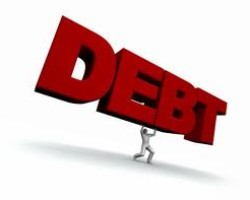
Once a consumer obtains a loan, an entirely different set of actors and rules comes into play in collecting the loan should it go into default. For many consumers, defaulting on a loan is inevitable when unemployment, medical emergencies, or some other financial crisis leaves them unable to cover the payments.
The Great Recession only made this outcome more likely for more U.S. households. Currently, more than one in seven adults is being pursued by debt collectors in the U.S., for amounts averaging about $1,500 (Federal Reserve Bank of New York, 2014).
If a borrower is unable to make payments on a loan for a certain period of time, the lender will
typically deem the obligation to be in default and attempt to collect on the debt. The lender can
do so by pursuing the borrower itself using an internal collections department or by outsourcing
collection activities to a third-party debt collector or law firm. The lender generally will also report
the debt to the major credit reporting agencies (CRAs).
The third-party debt collection industry has grown tremendously over the past few decades, with
2010 revenue more than 6.5 times that of 1972, after controlling for inflation (Hunt, 2013). The
industry’s participants make more than one billion consumer contacts annually for hospitals, govern
-ment entities, banks and credit card companies, student lenders, telecommunications companies, and
utility providers (Hunt, 2013).
The federal Fair Debt Collection Practices Act (FDCPA) prohibits unfair, deceptive, and abusive
debt-collection practices, such as threatening consumers, misrepresenting consumers’ rights, and
making harassing phone calls. However, the FDCPA only applies to third-party debt collectors and
thus does not apply to creditors—such as many banks and hospitals—that collect their own debts.
The Consumer Financial Protection Bureau (CFPB) has the authority to write and enforce rules
related to this statute and can also examine “larger participant” debt collectors for compliance. In
many states, debt collectors must be licensed in order to collect debts in the state and thus are also
subject to state oversight.
Although debt collection plays an important role in the functioning of the U.S. credit market, it
may also expose American households to unnecessary abuses, harassment, and other illegal conduct.
The Federal Trade Commission (FTC) received over 200,000 complaints about debt collection in
2013—second only to complaints regarding identity theft (FTC, 2014a).
[…]
© 2010-19 FORECLOSURE FRAUD | by DinSFLA. All rights reserved.



